Psst, let’s dive into the world of organic pillows – because, let’s face it, we all deserve a greener good night’s sleep! If you’re like me, passionate about sustainability and a tad obsessed with all things eco-friendly, then you know the struggle of finding the perfect pillow.
Not just any pillow, but one that aligns with our planet-loving hearts.
Remember the days of wandering through aisles of pillows, each one more synthetic than the last? They’re like the environmental equivalent of a bad date – they seem promising at first but end up being full of stuff we really don’t want.
And, let’s be honest, who hasn’t had a moment of despair, face-planted in a pile of polyester, wondering if a truly sustainable snooze is just a dream?
Well, my friends, fear not. I’ve been on this eco-journey for over a decade, and I’m here to guide you through the fluffy forest of organic pillow options. In this blog, we’ll unravel the mysteries of what makes a pillow not just good for your sleep but good for the planet too. So, fluff up your current (probably not-so-green) pillow, get comfy, and let’s embark on this journey to find the ultimate organic pillow.
How We Selected the Best Organic Pillows for You
When we set out on my quest to find the perfect organic pillows, we knew it wasn’t just about picking any pillow off the shelf. It’s the heart and soul of it – the materials – that make all the difference. So, here’s how we dug deep to bring you the cream of the crop in the world of organic pillows.
First off, our testing team at GreenCitizen Inc. zoned in on what really matters: the stuff inside. I’m talking about the purest natural latex, the softest organic cotton, the most resilient Buckwheat Hulls, and the coziest organic wool.
Now, you might wonder, “What makes these pillows truly top-notch?”
You should focus on certifications like Global Organic Textile Standard (GOTS), Global Organic Latex Standard (GOLS), USDA Organic, or GreenGuard.
But it wasn’t just about what’s inside. We considered how these pillows cater to your sleep. Whether you’re a side sleeper who dreams of cloud-like softness or a back sleeper needing that extra neck support, we’ve got you covered. Durability? Check. Cooling features for those warm nights? Double-check. We sifted through countless options to find pillows that adapt to all kinds of sleepers.
In short, we left no stone unturned (or should I say, no pillow unfluffed?) to bring you a selection that’s not just good for the planet but perfect for your sleep, too.
6 Best Organic Pillows for Clean Sleep and a Clear Conscience
1. Naturepedic: Certified Organic Pillows with a Health-First Mission

Naturepedic has long championed a cleaner, safer sleep — and their organic pillows are no exception. Designed with health-conscious families in mind, these pillows are made using GOTS-certified organic cotton and PLA (a plant-based fiber), offering a non-toxic alternative to conventional foam and polyester options.
The brand goes beyond greenwashing. Naturepedic is a certified B Corp and MADE SAFE® certified, and they openly reject the use of flame retardants, polyurethane foam, glues, or adhesives in all their pillows. This makes their products a safe choice for those with allergies, chemical sensitivities, or simply a desire to sleep cleaner.
Manufactured in an Ohio-based, eco-certified facility, their pillows reflect deep transparency and supply chain control. From farm to factory, every step is vetted for purity and sustainability.
If you’re searching for organic pillows that prioritize both personal health and planetary health, Naturepedic is a brand built on trust — and it shows in every stitch.
2. PlushBeds: Organic Pillows Backed by Ethical Sleep Science
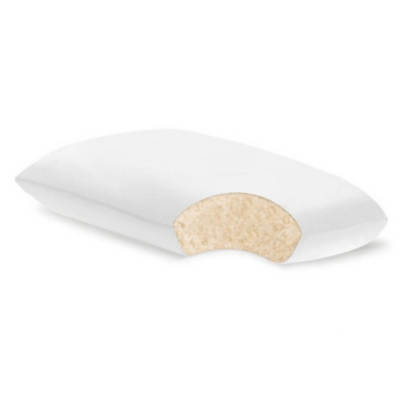
PlushBeds brings its clean sleep philosophy to the world of organic pillows with precision and care. Each pillow is made from certified organic latex or organic cotton, offering a naturally hypoallergenic and breathable option for eco-conscious sleepers. These aren’t mass-produced headrests — they’re thoughtfully engineered to align your spine while minimizing your environmental footprint.
What makes PlushBeds stand out in the organic pillow market is their material integrity. They use GOLS-certified latex tapped from sustainable rubber tree farms, paired with GOTS-certified organic cotton covers. No synthetic fillers. No chemical off-gassing. Just clean, honest comfort.
Their pillows are made in a California-based, GREENGUARD Gold certified facility, helping reduce indoor air pollution in your home. PlushBeds also ships with recyclable packaging and supports carbon offset programs, reinforcing their commitment to sustainability beyond just the product.
For those seeking organic pillows that combine luxury, longevity, and ethical manufacturing, PlushBeds delivers a plush night’s sleep with a planet-friendly purpose.
3. Eco Terra Beds: Organic Pillows from a Soil-to-Sleep Philosophy
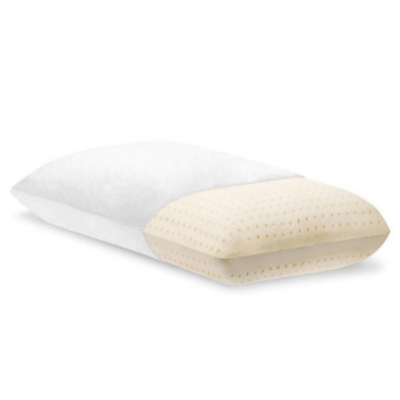
Eco Terra Beds may be better known for their organic latex mattresses, but their organic pillows hold their own with the same commitment to sustainable sleep. Handmade in California, their pillows feature GOLS-certified latex and GOTS-certified cotton, creating a naturally cooling, pressure-relieving pillow without chemical additives.
Their latex is sourced from sustainable, non-GMO rubber tree plantations — no synthetic blends, no petroleum-based fillers. That raw material purity helps reduce long-term environmental impact and supports fair trade farming practices abroad.
Eco Terra also keeps its operations lean and local. By manufacturing in-house and selling direct-to-consumer, they reduce the carbon emissions associated with third-party warehousing and global shipping.
For anyone looking for eco-luxury organic pillows that support ethical sourcing and waste-reduction, Eco Terra Beds delivers sustainable comfort with zero fluff — well, except the literal kind.
4. Coop Sleep Goods: Customizable Comfort with a Sustainable Twist
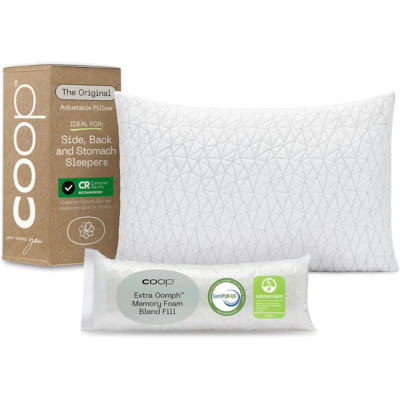
Coop Sleep Goods approaches organic pillows with innovation and adaptability. While not all of their pillows are certified organic, their Original and Eden series offer OEKO-TEX and CertiPUR-US certified components — free from harmful chemicals like formaldehyde and heavy metals.
Their standout feature is adjustability: users can add or remove the pillow fill to dial in the perfect loft and firmness. That means fewer pillow replacements over time — a subtle but important nod to sustainability.
Coop Sleep Goods also operates with social and environmental accountability. Their packaging is minimal and recyclable, and they donate gently used returns to women’s shelters and foster care programs.
Though not the purest “organic” option on this list, Coop Sleep Goods makes a strong case for durable, long-lasting pillows with mindful material use — an ideal gateway for shoppers easing into the organic pillows space.
5. Sleep On Latex: Simple, Sustainable, and 100% Natural
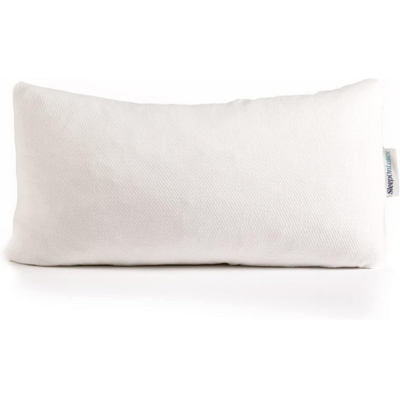
Sleep On Latex takes a refreshingly honest approach to organic pillows. They don’t overcomplicate things — their pillows are made from 100% natural latex harvested from sustainable rubber plantations, and covered in GOTS-certified organic cotton.
They skip synthetic blends and opt for a single-source material strategy that ensures consistency and eco-integrity. The result is a resilient, breathable pillow that resists dust mites and stays cool all night — without chemical treatments or VOC emissions.
Sleep On Latex manufactures in the U.S., with a commitment to energy-efficient production and zero flame retardants. The simplicity of their approach makes their pillows not only eco-friendly but also more affordable than many competitors in the organic space.
If you’re after organic pillows that do the job with fewer ingredients and more integrity, Sleep On Latex is proof that less can be a whole lot more.
6. Avocado: Organic Pillows with a Carbon-Negative Commitment
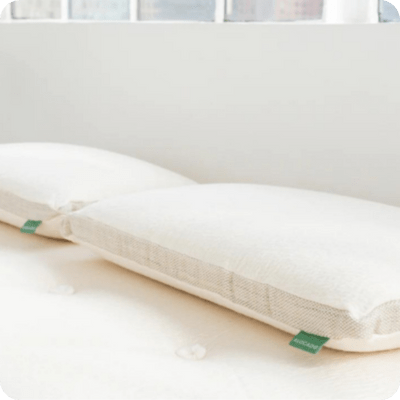
Avocado doesn’t just sell organic pillows — they build entire sleep ecosystems rooted in sustainability. Their pillows are made with certified organic latex, organic kapok fill, and GOTS-certified cotton, offering soft support with a planet-positive profile.
What really sets Avocado apart is their carbon-negative certification. They offset more carbon emissions than they produce through renewable energy, sustainable farming partnerships, and reforestation efforts. Every pillow purchase directly contributes to those goals.
Avocado also owns its own organic farms and co-operates a GOTS/GOLS-certified factory in Los Angeles. This vertical integration ensures complete transparency — from rubber tree to pillowcase.
If you’re looking for organic pillows with serious climate credentials, Avocado delivers high-performance comfort that doesn’t cost the Earth.
What Is An Organic Pillow?

Ever wondered what exactly makes a pillow “organic”?
Let’s break it down in simple terms. Organic pillows aren’t just any pillows. They’re specially made from materials like latex, cotton, wool, kapok fibers, or even buckwheat. These aren’t your regular crops – they’re grown without those harsh chemical pesticides, and farmers put in the extra effort to save water and reduce waste.
Now, why are these pillows becoming the talk of the town?
Two words: environmentally friendly.
They’re not just kind to the earth; they’re biodegradable, too. More and more of us are realizing that our shopping choices can really impact the planet. Plus, when you hear “organic,” often it means better living conditions for the people growing these materials.
But how can you, as a shopper, know if a pillow is truly organic?
You can’t exactly tell by just looking at it, right? That’s where the USDA steps in with some strict regulations. For extra peace of mind, there are third-party organizations like the Global Organic Latex Standard (GOLS) and the Global Organic Textile Standard (GOTS). Trust me, if a pillow claims to be organic but doesn’t have the certification to prove it, think twice.
You might also see pillows labeled as “natural.” This means the materials are from Mother Nature, not man-made. They tend to be biodegradable and friendlier to our planet compared to synthetic stuff.
But here’s the catch: “natural” doesn’t always mean pesticide-free. These crops can still be treated with chemicals, and the finished product might have some not-so-great stuff like bleach or chemical dyes.
This is why going organic can be a safer bet, especially if you have sensitive skin or allergies. Organic materials tend to be gentler and less likely to cause any irritation.
Choosing the Perfect Organic Pillow: A Guide to Sleep Bliss

Picking the right organic pillow is key to a great night’s sleep. It’s not just about lying your head down; it’s about finding the perfect support.
And, let’s be real, not every pillow suits everyone. Your body type and how you sleep play huge roles in what works for you. Plus, with organic pillows, you’ve got to watch out for those “green” claims that don’t always hold up.
Here’s a simple guide to help you choose wisely:
1. Loft (Pillow Height)
Think of loft as the pillow’s height. It fills the gap between your head, neck, and the mattress. Side sleepers? You’ll probably need a higher pillow for shoulder support. Stomach sleepers, go for something flatter to keep your neck comfy. If you’re not sure, adjustable-fill pillows are a game-changer.
2. Support
The main job of your pillow? Keeping your head and neck aligned with your spine. Too soft, thin, or thick, and you might wake up sore. A well-supported sleep is a comfortable sleep.
3. Firmness Level
Firmness isn’t just about comfort; it’s about balance. Too firm might cause pressure points, while too soft might not support enough. Remember, a plush but high pillow might let your head sink more, affecting loft.
4. Organic Certification
With organic pillows booming, some brands might exaggerate their claims. Look for certification from reputable organizations to ensure your pillow is genuinely organic.
5. Pressure Relief
Pillows should ease pressure, both by cushioning your head and supporting areas that might not touch the pillow. Materials like plush latex, kapok fibers, and cotton usually offer better pressure relief because they contour nicely.
6. Temperature Regulation
No one likes waking up sweaty. Organic materials like latex, buckwheat, kapok, cotton, and wool are known for keeping cool, thanks to their airflow-friendly nature.
7. Shape
Most pillows are rectangular, but if you have neck pain or other issues, a cervical pillow (shaped to fit the head and neck) might be better. Organic latex is great for these since it can be shaped in various ways.
8. Price
Yes, organic materials can be pricier. But don’t worry; you can find affordable options like cotton or kapok fiber pillows. More expensive ones might last longer, but most organic pillows beat synthetic ones in longevity.
9. Quality Materials
Just because it’s labeled “organic” doesn’t mean it’s all high-quality. Check the materials – are they 100% organic, or mixed with other stuff? Knowing the properties of different materials helps match the pillow to your sleep style.
10. Moldability
Some of us love to hug or squish our pillows into shape. If that’s you, look for pillows with fluffier fibers like cotton or kapok. Solid latex pillows, for instance, aren’t as easy to mold.
Understanding the Types of Organic Pillows
Organic Cotton: The Breathable Choice
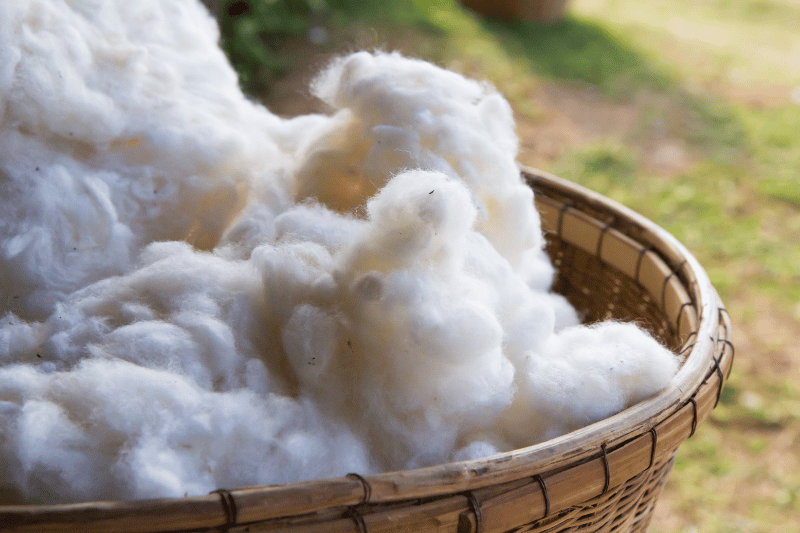
When it comes to organic cotton, think of a pillow that breathes with you. Picture a cover that’s soft to the touch or a filling that gives your head a fluffy cloud to rest on. Unlike its regular counterpart, organic cotton is grown with less water and without harsh pesticides, making it a win for both your sleep and the planet.
Remember to check for the GOTS certification – it’s your assurance that you’re getting a product with at least 70% organic materials.
I recall the first time I switched to an organic cotton pillow – the difference in my sleep quality was like night and day!
Organic Latex: For the Love of Bounce
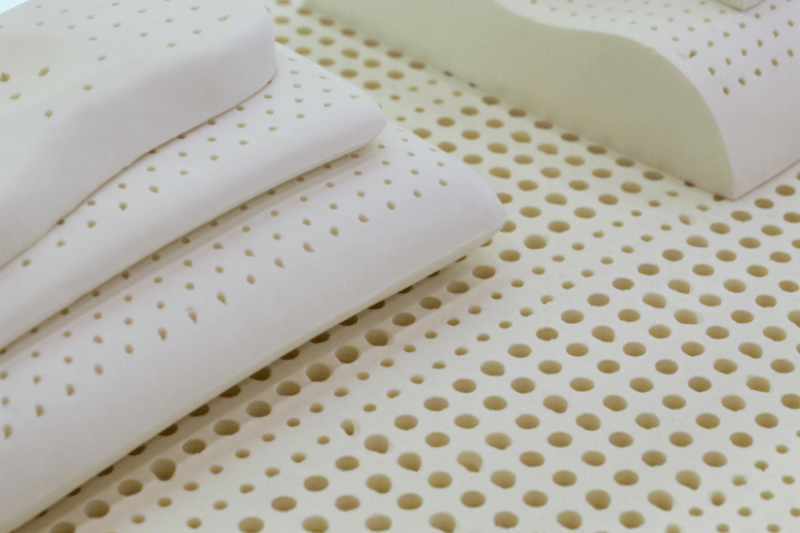
Organic latex is all about that springy, supportive feel. Made from the sap of rubber trees, it’s perfect for those who enjoy a pillow that gently contours to their head without feeling too rigid.
There are two types of organic latex: Talalay and Dunlop. I’ve found Dunlop to be the more sustainable option, as it uses fewer chemicals.
And when you’re shopping, look for the GOLS certification to ensure you’re getting a product that’s at least 95% natural latex.
Organic Wool: The Temperature Regulator

Now, let’s talk about wool – it’s not just for sweaters! Wool from sheep, lambs, and goats is used in both the cover and fill of pillows, offering a springy, supportive feel.
Its natural moisture-wicking properties mean it keeps you cozy in winter and cool in summer.
I always recommend looking for pillows made with ethically sourced wool to support animal welfare and sustainable practices.
Buckwheat Hulls: Firm and Earthy
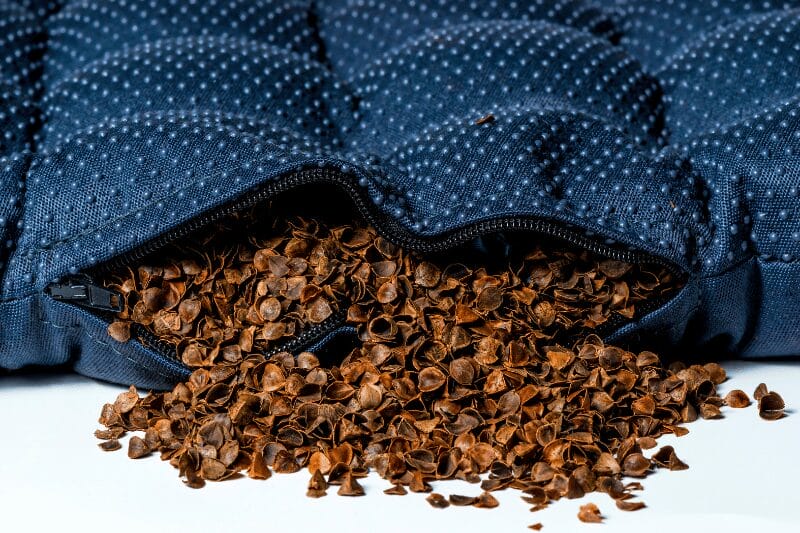
Buckwheat hull pillows offer a unique firmness that can be an acquired taste. They’re extremely breathable and provide solid support. While some might find them too firm or noisy, I’ve known others who swear by their supportive structure.
One downside is they can be heavier and more expensive, but for the right sleeper, they’re a treasure.
Silk: The Touch of Luxury
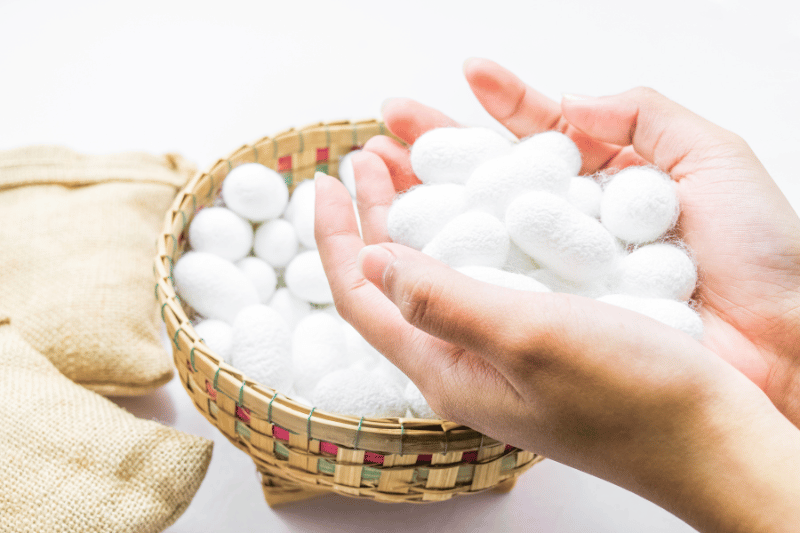
Silk pillows are the epitome of smoothness and luxury. Spun by silkworms, this fine material is often reserved for high-end pillows. They’re a more expensive option, but for those who crave a touch of opulence in their sleep, silk is a dream.
Responsible Down: Softness with a Conscience

Responsible down pillows, filled with duck and goose plumage, are all about unparalleled softness. However, ethical concerns arise with down, often leading to blends with regular feathers for affordability.
The Responsible Down Standard ensures humane treatment of birds. As someone who values animal welfare, I recommend this certification for peace of mind.
However, if you prefer to avoid animal products or have allergies, down might not be your best choice.
Kapok Fibers: The Sustainable Softness
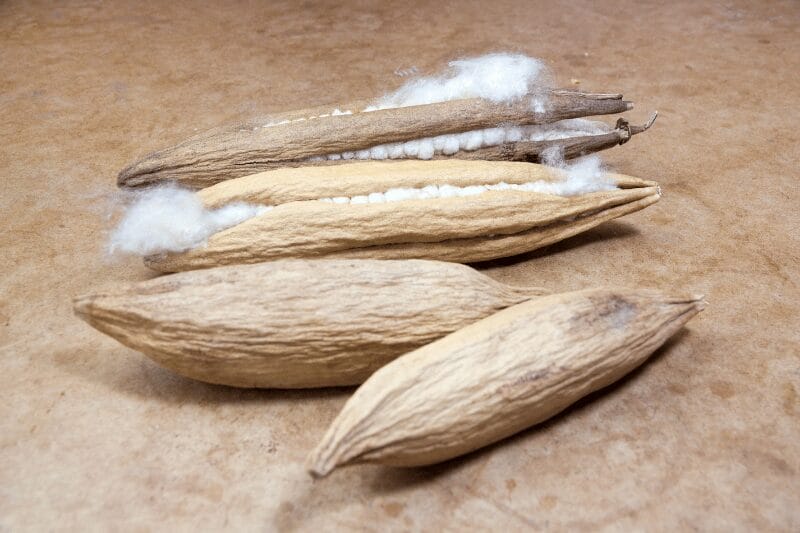
Kapok fibers, derived from kapok trees, offer a lofty feel quite similar to down. What makes kapok stand out is its sustainability – requiring minimal irrigation and pesticides.
For those looking for an eco-friendly alternative to down, kapok is a fantastic option.
Pros and Cons of Organic Pillows

Pros
Cons
- Eco-Friendly: Made from natural materials without harmful pesticides or chemicals, benefiting the environment.
- Healthier Option: Lower risk of exposure to toxins and allergens, making them a safer choice for sensitive individuals.
- Sustainable Production: Often sourced from sustainable farming practices, promoting better use of resources.
- Biodegradable: Natural materials are typically biodegradable, reducing landfill waste.
- Comfort Variety: Available in various materials like latex, wool, and cotton, offering diverse comfort options.
- Breathability: Natural fibers offer superior breathability, leading to a cooler sleep experience.
- Durability: Tend to last longer than synthetic pillows, maintaining shape and support over time.
- Higher Cost: Generally more expensive than conventional pillows due to the cost of organic materials and certification.
- Limited Availability: Not as widely available as synthetic pillows, with fewer options in local stores.
- Care Requirements: May require special care or cleaning methods, and some materials cannot be machine-washed.
- Firmness Degradation: Natural fillings like down or wool may lose loft over time, requiring fluffing or adjustment.
- Potential Allergies: Some natural materials, like wool or down, can trigger allergies in sensitive individuals.
Final Words
Choosing the right organic pillow involves balancing personal comfort with environmental and health considerations. From the luxurious feel of silk to the firm support of buckwheat hulls, each material offers unique benefits.
Remember, investing in an organic pillow not only enhances your sleep quality but also supports sustainable practices and a healthier lifestyle.
Ready to experience the difference?
Choose your perfect organic pillow from our recommended list and step into a world of eco-friendly, comfortable sleep.
Your dream sleep awaits!
